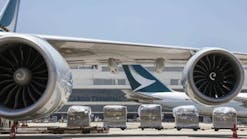Safety is the core of our mission and this guides all of our decisions. The FAA thanks AT&T and Verizon for agreeing to a voluntary delay and for their proposed mitigations. We look forward to using the additional time and space to reduce flight disruptions associated with this 5G deployment.
Background
- The wireless companies have offered to implement a set of mitigations comparable to measures used in some European operating environments. While U.S. standards and operating environments are unique, we believe this could substantially reduce the disruptions to air operations.
- These additional mitigations will be in place for six months around 50 airports identified as those with the greatest impact to the U.S. aviation sector.
FAA 5G Statement issued on January 2, 2022
We are reviewing the latest letter from the wireless companies on how to mitigate interference from 5G C-band transmissions. U.S. aviation safety standards will guide our next actions.
Background on Timeline5G and aviation have safely coexisted in other countries because power levels have been reduced around airports and the industries have worked together prior to deployment. For years, we have been working to find a solution in the United States:
- Since 2015, the FAA and the world aviation industry jointly raised concerns both industries would need to address to achieve similar results and had ongoing technical discussions. In the World Radio Conference proposal, the proposal only supported an international mobile telecommunications (IMT—i.e., 5G) allocation in the 3.4 to 3.7 GHz spectrum—not the 3.7 to 3.98 GHz spectrum that is the issue for radio altimeters.
- In 2018, Boeing raised concerns and proposed a solution. Additionally, ICAO, the aviation arm of the United Nations, identified that any use of the bands near 4.2 to 4.4 GHz should be contingent upon Radio Altimeter Studies.
- In 2018, the Air Line Pilots Association raised concerns to the FCC.
- In 2020 ahead of the auction for 5G C-Band, the FAA again raised concerns and asked for a postponement to collaborate on a solution. The NTIA, the federal government coordinator on spectrum disputes, failed to put the 2020 letter into the FCC's docket.
- Throughout 2021, the aviation industry continued to ask for additional collaboration and time in anticipation of the complications we now face. The industry also held several meetings throughout the year to find solutions, including in June and October.

